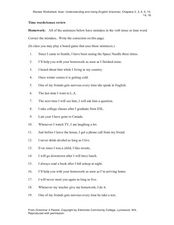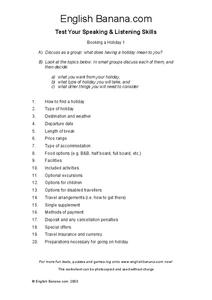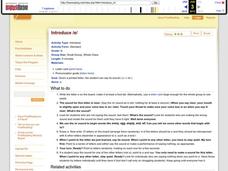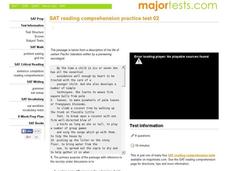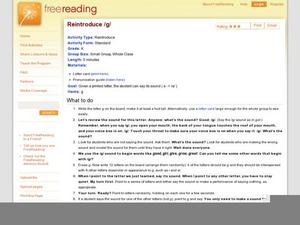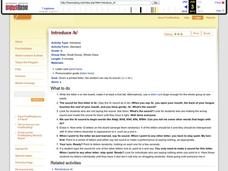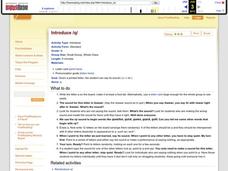Curated OER
Spelling Proofreading Worksheet
Looking for a quick spelling activity to use as a quiz or warm-up? This resource provides a paragraph of eleven sentences, all of which contain a spelling error. Young learners list the mistakes on the lines below. Make a game out of...
Curated OER
Time Words/Tenses Review
For homework, give your class this review sheet. This practice opportunity contains 42 sentences, and your learner must edit the sentences by correcting their mistakes. Most of the mistakes are directly related to verb tense. Great...
Curated OER
Speaking and Listening Skills
Build oral fluency with your English language learners. They use the topic of vacations or holidays to practice posing questions and creating answers. A long list of subtopics is included here. Consider breaking your class into pairs and...
Curated OER
Sorting
Students examine the concepts of organization and classification. In this library skills lesson, students practice ordering and sorting skills by playing an interactive Internet game. Students then practice their classification skills in...
Curated OER
Introduce /e/
Examine the most-used letter in the English language incorporating pronunciation, letter recognition, letter sound, and word examples for the letter e. Scholars examine the letter shape and listen to you pronounce the /eee/ sound. As you...
Curated OER
Alphabetical Order 3
If your class is working on alphabetical order, then this worksheet might be for you! Class members alphabetize 10 words, using the spaces below the words to record their responses. Make it into a game and have leaners race to the finish...
Curated OER
SAT Reading Comprehension Practice Test 02
This reading comprehension worksheet, modeled after the SAT, includes a passage written by a sociologist and 8 multiple choice questions. Ten minutes is allocated for this practice test.
Curated OER
Introduce /a/
Start your alphabet study strong using these strategies combining pronunciation, recognition, letter sound, and word examples focused on the letter a. Scholars examine the letter shape and listen to you pronounce the /aaa/ sound. As you...
Curated OER
Introduce /t/
What sound does the letter t make? As scholars develop letter recognition, form sound associations with strategies like these. Explain the tongue movement in making the /t/ sound, asking learners to try it. Draw the t on the board and...
Curated OER
Introduce /r/
Use these inventive strategies to focus on the letter r, forming sound associations along with letter recognition. Explain the tongue movement in making the /r/ sound, asking learners to try it. Draw the r on the board and give examples...
Curated OER
Reintroduce g
Synthesize pronunciation, recognition, letter sound, and word examples as scholars learn all there is about the letter g. They examine the letter shape and listen to you pronounce the hard /g/ sound. As you explain how this sound is...
Curated OER
Introduce Soft-C
Do your emerging readers know that letters sometimes borrow the sounds of other letters? Explore the soft /c/ sound, explaining that c has borrowed the sound from s. After giving scholars some examples of words that begin with this...
Curated OER
Introduce /k/
Explore the ins and outs of the letter k using these strategies combining pronunciation, letter recognition, and initial phoneme examples. Scholars examine the letter shape and listen to you pronounce the /k/ sound. Use these tips to...
Curated OER
Reintroduce /c/
Do you c what I c? Use these strategies combining pronunciation, letter recognition, and initial phoneme examples to examine the letter c with kindergartners. Scholars examine the letter shape and listen to you pronounce the soft /c/...
Curated OER
Introduce /Q/
Everything your pre-readers need to know about the letter Q is right here; this strategy combines pronunciation, letter recognition, sound, and word examples. Scholars examine the letter shape and listen to you pronounce the /kwww/...
Curated OER
Magic Squares: The Awakening
After matching words drawn from Kate Chopin’s novel, The Awakening, with their definitions, readers complete a magic square game. Included are instructions for how to develop magic squares.
Curated OER
Star Wars: Rays and Angles Edition
Rays and angles and Star Wars? It sounds strange, but it's actually a fun game to help fourth graders get good at measuring and identifying angles and rays with a protractor. Each pair of children chooses which Star Wars character they'd...
Egmont
H.O.R.S.E.
Extend your lesson on Christopher Myers' H.O.R.S.E with a series of activities about basketball. After kids read the book, they match basketball terms with their definitions, find as many words as they can with the letters H, O, R, S,...
Novelinks
The Giver: Vocabulary Bingo!
Bingo! Combine the thrill of bingo with Lois Lowry's The Giver in a fun vocabulary lesson. Kids write selected vocabulary words from the novel onto a bingo chart, and then listen for the correct definitions in order to mark off their words.
ESL Kid Stuff
Zoo Animals
Let's go to the zoo! Take a pretend trip to the zoo with a lesson plan about animals that live at the zoo. Kids sing, match animals, practice animal sounds, and read about Sammy the Snake's birthday party.
Florida Center for Reading Research
Fluency: Words, Fast Match
Here is an interesting take on the old timed-fluency activity. In pairs, learners work together to see how fast they can read two sets of high-frequency words. Peer one reads a word from his list; peer two works fast to find that word in...
ESL Kid Stuff
Classroom Objects
How many classroom objects can your learners identify? Use a set of activities based on object recognition and color matching to help young kids use their observation to learn new vocabulary.
Curriculum Corner
16 Fall Themed Math and Literacy Centers for Kindergarteners
Look no further because your fall literacy and math centers are here. Cards allow learners to practice counting, writing, tracing, finding missing numbers and letters, skip count, and match letters to their sounds.
K12 Reader
Write a Noun for the Adjectives
Adjectives can't exist without something to describe! Young writers find nouns to match ten short adjectives in a straightforward grammar worksheet.



